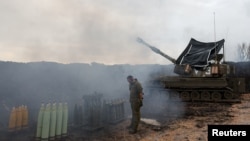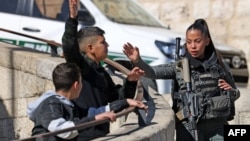Israel was set to launch a preemptive strike against Lebanon’s Hezbollah militia early in its war against Hamas, but the strike was called off at the last minute
Gadi Eisenkot, a former army chief and a member of Israel’s war cabinet, confirmed the planned strike and its reversal in a televised interview Thursday on Israel’s Channel 12 TV.
Eisenkot said he believed the strike would have triggered a regional war.
He and former Defense Minister Benny Gantz were against the move.
Eisenkot argued against the strike in an October 11 meeting until he was hoarse, he said.
A Wall Street Journal report last month said that U.S. President Joe Biden called Israeli President Benjamin Netanyahu and told him to stand down.
When Eisenkot was asked if his and Gantz’s presence in the war room helped to prevent a bad decision, Eisenkot replied, “Unequivocally.”
Deteriorating health care
In Gaza on Friday, the Hamas-run health ministry said that 77 people were killed overnight and dozens more were wounded as Israel pounded the southern Gaza city of Khan Younis with airstrikes and gunfire.
Several strikes occurred near Al-Amal hospital, according to the health ministry.
The deteriorating health care in Gaza is an increasing concern, the head of the World Health Organization said.
Tedros Adhanom Ghebreyesus said 24 cases of hepatitis A, an inflammation of the liver, have been detected in Gaza and several thousand people have jaundice, presumably linked to undiagnosed cases of hepatitis A.
“The inhumane living conditions — almost no drinking water, clean toilets or ability to keep the surroundings clean — will allow hepatitis A to spread further,” the WHO chief warned in a statement on X, formerly known as Twitter.
The inhumane conditions are making Gaza one of the most dangerous places in the world for a child, said Ted Chaiban, the deputy chief of UNICEF.
Chaiban, who spent three days in Gaza this week, said that since his last visit two months ago, the decline in conditions there is staggering. If they continue to decline, he said, “we could see deaths due to indiscriminate conflict compounded by deaths due to disease and hunger,” he said in a statement.
Netanyahu and Palestinian state
Israeli Prime Minister Benjamin Netanyahu said Thursday he has told the United States that he opposes Washington’s long-standing support for the creation of a Palestinian state as part of any postwar settlement of Israel’s war with Hamas militants.
Officials in Israel’s right-wing government have often expressed opposition to an independent Palestinian state alongside Israel. But Netanyahu’s statement at a nationally broadcast news conference appeared to be his most definitive on the issue and opened a clear public rift with the U.S., Israel’s key supporter in the war.
White House National Security Council spokesman John Kirby dismissed the Israeli leader’s statement.
"This is not a new comment by Prime Minister Netanyahu. We obviously see it differently," Kirby said.
As recently as this week, Secretary of State Antony Blinken told key political and business leaders at the World Economic Forum in Davos, Switzerland, that a "pathway to a Palestinian state" is essential for peace in the Middle East.
State Department spokesman Matthew Miller said Thursday, "There is no way to solve [Israel's] long-term challenges, to provide lasting security, and there is no way to solve the short-term challenges of rebuilding Gaza and establishing governance in Gaza and providing security for Gaza without the establishment of a Palestinian state."
At his news conference, Netanyahu said, "In any future arrangement … Israel needs security control of all territory west of the Jordan” River. "This collides with the idea of sovereignty. What can you do?"
Referring to Israel’s relations with the U.S., he added, “The prime minister needs to be capable of saying no to our friends."
Israel has said it does not plan to reoccupy Gaza at the end of the war with Hamas but has refused to spell out its day-after plans for the territory.
Netanyahu said Israel has destroyed about two-thirds of Hamas' fighting regiments in the Gaza Strip during three-plus months of war and vowed to continue the war until Israel has achieved "complete victory."
"There are two stages to the fighting. The first is destroying the Hamas regiments, those are their organized combat frameworks," Netanyahu said.
"Up until now, 16 or 17 out of 24 [regiments] have been destroyed. After that, there is the [stage] of clearing the territory [of militants]. The first action is usually shorter. The second usually takes longer," Netanyahu said. “Victory will take many more months, but we are determined to achieve it.”
The U.S. has for weeks pressed the Jewish state to curtail its massive offensive in Gaza to sharply limit the number of civilian deaths in the narrow territory along the Mediterranean Sea.
Israel is trying to erase Hamas’ control of Gaza after the militants killed 1,200 people in Israel in a shock October 7 attack that also allowed Hamas to capture 240 hostages.
Israel's air and ground military operations in Gaza have leveled large areas of the territory and killed more than 24,400 Palestinians and wounded at least 60,000 others, according to the Hamas-run Gaza Health Ministry.
Israel said Thursday it carried out attacks targeting militants in northern and southern Gaza, while the Health Ministry said an Israeli airstrike in Rafah killed 16 people.
The strike in Rafah, located along Gaza’s border with Egypt, struck a home, the Health Ministry said. Medical personnel said half of the 16 killed were children.
The Israeli military said its forces killed about 40 militants in the Khan Younis area in southern Gaza and several more militants during ground and air operations in the northern part of the strip.
Israel also said it carried out its latest airstrikes in southern Lebanon, targeting sites of the Hezbollah militant group, a Hamas ally. The Lebanon-Israel border has been the site of frequent cross-border attacks since the start of the war in Gaza.
Some information for this report was provided by The Associated Press, Agence France-Presse and Reuters.














